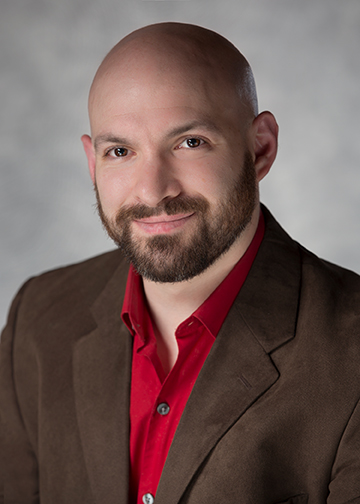How did you get into your field?

I’ve always had a passion for computers, thanks to my father, who was a programmer. He taught me to code, and I was using the internet before it became mainstream in the early ’90s. However, software engineering wasn’t as high-profile as it is now, so I leaned into my other passion—finance. By age 19, I’d passed my Series 7 and Series 63 exams and become a stockbroker. That’s when I discovered algorithmic trading, blending finance and technology. I found it fascinating and pursued both fields in college.
Then the dot-com crash happened, and I decided to switch gears and pursue what my college advisor deemed crash-proof fields: accounting and tax. I began interning at Viacom, which later spun-off CBS. Here I discovered tax technology—exactly what I loved. The internship led me to my first full-time job at WPP, a holding company for numerous advertising, marketing, and communications agencies around the globe. I worked in a hybrid role combining tax accounting and technology. After that, I joined American Express and once again focused on tax technology, which by now had become my specialty. My last role before Corptax was in tax tech and operations at Toronto Dominion Bank.
After using Corptax software at all the companies I worked for, it made perfect sense for me to join Corptax, and it’s an ideal fit.
Can you tell me a little bit more about your current role at Corptax?
My official title is Senior Manager of Professional Services. In this role, I help clients implement new functionality and show them how to use tax tech to solve tax challenges, achieve goals, streamline processes, analyze tax data for planning, and much more.
My role puts me in close contact with tax professionals in numerous corporate tax departments, so I act as a liaison between clients and Corptax teams—Development, Tech Ops, Product, and Customer Support to name a few. Based on working with clients firsthand, I provide our teams with input on new functionalities that will truly benefit customers and help them add value to their organizations.
What do you most enjoy about your job?
Corptax never tells me to ‘stay in my lane.’ The culture here gives me the freedom to try new things. Management is open to fresh ideas, and that kind of support is invaluable. We’re a small company—just 350 people—and it feels like a family. It’s the kind of place where the CEO knows you by name because of the close-knit environment.
Also, working with our clients and seeing them get so much out of our products is a great experience. I enjoy collaborating with a variety of people and sharing ideas. I’m always engaged in new projects, so the work stays exciting and dynamic.
Can you tell me one thing work has taught you, and why it’s important?
The biggest lesson I’ve learned at work is the value of patience. When I was younger, I wanted to achieve everything all at once, but over time, I’ve realized that progress often happens in small steps. You can’t ‘boil the ocean’ all at once.
Now, I understand that small wins add up over time, and that’s what matters. Patience is key—the ability to understand that things may require multiple attempts—and that setbacks are learning opportunities. And by continually pushing forward, you will reach your goal.
Plus, maintaining a positive attitude, even when things don’t go as planned, ensures you stay motivated and keep contributing.
What’s the best advice that you’ve ever been given, and who shared it?
In my early 20s, my first role at WPP involved significant tax compliance work. I had the opportunity to collaborate with a seasoned colleague who managed tax notices with impressive efficiency, while I focused on more complex and time-consuming tasks. At first, I wondered about the differences in our workloads and brought up my thoughts with our mutual boss.
He gave me valuable insight: a successful team thrives on a variety of strengths and work styles. He highlighted that while I was well-suited for tackling complex tasks, my colleague’s efficiency in handling routine tasks was equally vital. He explained that a well-rounded department benefits from both forward-thinking individuals and those who excel in managing essential, day-to-day tasks. This balance is what keeps a team strong and effective.
This insight has been instrumental in my career, highlighting the importance of valuing different roles within a team and recognizing that every contribution is necessary and vital to overall success.
What type of changes have you’ve seen in the last five years in your field?
Technology has brought exciting changes to the tax field. The days when Tax was relatively unchanging are behind us, and that’s a good thing—it opens up new possibilities.
A few years ago, I spoke at a conference in Nashville and said that relying on Excel and VLOOKUPs alone won’t cut it anymore. Today, tax professionals have new tools which allow them to advance in their careers, contribute more to their companies, and stay on the leading edge in our technological world.
During my talk, I highlighted this shift by sharing a story about CBS. Back in the 1950s, their tax department had 600 people, all working with ledgers, adding machines, typewriters, and reams and reams of paper. By 2010, that number had shrunk to nine. This story shows how technology has evolved to make tax work much more efficient.
After the talk, a fellow attendee expressed skepticism about the impact of AI. However, as AI-powered tools like ChatGPT have become mainstream over the past few years, that same person later reached out to acknowledge how much things have changed. AI is here to enhance how we work and create new opportunities in the tax field for us. I see the rise of AI and machine learning as an exciting development that will reshape our industry for the better.
Any parting thoughts on technology?
Today, Tax can leverage technology in so many ways; it’s a new frontier. We can not only be great with numbers, but leverage our data to streamline our work, do big-picture thinking, advise our companies, and so much more. For those willing to adopt and learn tech, the future of Tax is full of possibilities.
Meet the Senior Director leading the future of tax tech training at Corptax
about this topic